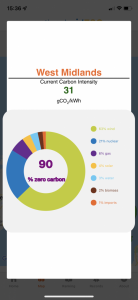Posted by: @editorToday is another intensive day. 302g/kWh as a UK average. For the first time I truly understand the argument for nuclear energy. Interestingly, I think the Chinese had a successful fusion test earlier this year.
Hi Mars,
The World already has a fusion reactor, it is called the Sun, it is just that we humans are not very good at capturing the energy that it provides.
For those into tech there is a carbon intensity forecast api by region.
This could be used to time when you draw electricity from the grid
Posted by: @bataltoI'd just like to correct a misconception everyone here seems to have. The UK has in fact reduced it's power use massively over the last decade or so. Down from 357TWh in 2005 (60m people) to 287TWh in 2020 (67m people). We have over 10% more people and used 20% less power in total terms. Along side this the UK used large amounts of coal, which has also been phased out.
Not entirely sure there's a misconception going on, and with any clarification your details raise questions as well as answer them.
Therefore, to give a bit of wider context, in some ways supporting what you say and in others perhaps contradicting, I thought I'd give a few interesting statistics. I'm refraining from giving any opinions on these figures so you can all interpret as you wish.
- Energy generation in the UK is currently 305TWh compared with the 2005 high of 395TWh. This puts current generation at the same levels as 1987.
- Electricity consumption per head of capita in the UK reached a high in 2003 of 6,640kWh, and is now at 4,500kWh.
- Energy consumption overall per head of capita in the UK (which includes travel and so forth) was largely plateau'd until 2005, with 2005 levels at 44,931kWh. It has steadily fallen since then to 32,250kWh as at 2019. That is a 28.2% reduction.
- Simple CO2 emissions (used because of the wide historic span of data) per head of capita in the UK is currently at 4.85t as at 2020. The last time it was at that level was 1857, and it reached a peak in 1971 of 11.85t. To give further context, the world average has been increasing until 2018 and has only just started reducing. As of 2020, all the UK reduction has basically just reduced the per capita emissions to the global average (4.85t UK vs 4.47t globally).
- Once CO2 emissions are adjusted for trade (moving carbon emissions of production to country of consumption), the per head of capita figure was pretty constant until 2007 (12.19t) and has now dropped to 7.71t as of 2019. That is a 36.75% reduction.
The UK has come a long way in a short period of time, but there's still lots to do. If you want to look further into the details, I've gleaned all the data from Our World in Data
105 m2 bungalow in South East England
Mitsubishi Ecodan 8.5 kW air source heat pump
18 x 360W solar panels
1 x 6 kW GroWatt battery and inverter
Raised beds for home-grown veg and chickens for eggs
"Semper in excretia; suus solum profundum variat"
The uk government target is 100% of electricity will come from clean sources by 2035.
OK some of the ways of measuring this i suspect will be controversial and we might not make that date but the direction of travel to reduce CO2 in electricity is already in train with current and projected projects.
In the UK fossil fuels for electricity will be gone in my lifetime for anything but emergency backup when "clean" energy is not available.
Mentions HVO and potentially banning replacement oil burners in 2026
@jeff, thanks for that. I think it’s crazy that the government doesn’t consider alternatives. Heat pumps are amazing, but since we’ve been on the HVO trial we are currently emitting less CO2 than running our heat pump off electricity generated by gas. Even if it’s for a few years, get people using HVO instead of kerosene for those that don’t go down the heat pump route because kerosene is awful in terms of emissions.
Buy Bodge Buster – Homeowner Air Source Heat Pump Installation Guide: https://amzn.to/3NVndlU
Follow our sustainability journey at My Home Farm: https://myhomefarm.co.uk
@jeff The problem with the government making these types of statements is it creates mass replacement prior to the deadline. That is not environmentally friendly as it keeps oil boilers in use for a longer period than would have happened if natural age forced boiler change. Environmentally it increases waste and creates problems with aged storage which in many cases would be in excess of 20 years and getting to end of life. Oil boilers may face a double whammy and that is the government may force change prior to a boiler coming to the end of life. That could mean a double cost in a short time.
Posted by: @editor@jeff, thanks for that. I think it’s crazy that the government doesn’t consider alternatives.
...
@editor ...except they have; they've just discounted HVO.
Don't get me wrong, I disagree with the decision and I can see a number of issues with their approach, but I can see more holes in the argument put forward by the letter writer in @jeff's article.
The big sticking point with lower carbon heating in older houses is that of insulation. Popular "wisdom" given in many Internet arguments is that old buildings need to breathe, insulation reduces airflow and therefore insulating holder properties is bad for them. WRONG. Widely available, but far less publicised, evidence shows there are many forms of insulation available for use in older buildings that reduce heat transfer whilst retaining breathability (worth checking out the SPAB briefing document on energy efficiency). The problem is that there is a cost to heating and maintaining older buildings, and owners have historically chosen (often by default out of ignorance) to pay the additional cost in instalments through simply piling more energy into their homes rather than in one go through insulation. That is no longer tenable.
Personally, given the demonstrable short term benefits in reduced carbon emissions, I feel discounting HVO is a mistake despite acknowledging at the same time that its acceptance would effectively extend the use of many oil fired boilers that ought to be retired. I also feel that the Government's strategy is far to politicised. However, the strategy does link in significantly with the Clean Growth Strategy in exploring avenues for increasing home energy efficiency in parallel with decarbonised heating solutions. In other words, it's not a perfect strategy but it's not all bad.
105 m2 bungalow in South East England
Mitsubishi Ecodan 8.5 kW air source heat pump
18 x 360W solar panels
1 x 6 kW GroWatt battery and inverter
Raised beds for home-grown veg and chickens for eggs
"Semper in excretia; suus solum profundum variat"
Posted by: @prjohn@jeff The problem with the government making these types of statements is it creates mass replacement prior to the deadline. That is not environmentally friendly as it keeps oil boilers in use for a longer period than would have happened if natural age forced boiler change. Environmentally it increases waste and creates problems with aged storage which in many cases would be in excess of 20 years and getting to end of life. Oil boilers may face a double whammy and that is the government may force change prior to a boiler coming to the end of life. That could mean a double cost in a short time.
If I’m reading the report correctly, the aim is for decarbonisation by 2050 and the report recognises that new oil boilers in particular could have a life of up to 20 years with repair and maintenance, hence the commitment to stop new installations by 2026, slightly prematurely. To add a cynical note, the delay, as you say, may create a rush to install new units, allowing manufacturers to offload existing stock and to manage disruption to supply chains as they wind down, thereby maintaining revenue. It may also prompt a rush to install heat pumps putting homeowners at the mercy of dodgy specifiers and installers, leading to yet more dissatisfaction with heat pumps. Not what is wanted at all. There is also the issue of the availability of qualified and trusted specifiers and installers which may take several years to improve. Albeit that the estimated number of oil boiler replacements appears to be less than 1 million, so should not be that onerous over even a short run in. There are also hints that the carbon cost of heating oil should be factored, possibly implying a hike in taxation to make oil expensive, a triple whammy if you like.
Current electric generation carbon footprint for my local zone. I recognise footprint varies by day/time. I’m still not convinced by HVO. Not that I have a choice as I had my oil boiler removed
Daikin Altherma 3H HT 18kW ASHP with Mixergy h/w cylinder; 4kW solar PV with Solic 200 electric diverter; Honda e and Hyundai Ioniq 5 P45 electric vehicles with Myenergi Zappi mk1 charger
@majordennisbloodnok, thanks for the insights. I was not aware that HVO prices had dropped. I was just speaking to someone from OFTEC this week (partially about HVO) and they said they were still campaigning to get duties, VAT, etc. removed and/or reduced.
On the subject of HVO, I know that many homeowners that have gone down the heat pump route are opposed to HVO, and that's perfectly fine.
As a household, we are very much into renewables and we're huge heat pump advocates. The reality is that there are 1.5 million homes in the UK that use kerosene for heating. Kerosene is a horror when it comes to CO2 emissions. So why not switch these households to this fuel, which is an instant fix, while we figure out how to get everyone onto heat pumps. We're also helping to get rid of all those fats and oils used in fast food and commercial kitchens.
One other point that I find distressing is that the grid has not been running very green this winter in the UK – CO2 emissions throughout January have been well over 300g/kWh of electricity produced. That is far from green and is really the equivalent of using a gas boiler. So even as our swanky heat pumps produce heat with no visible fumes, it's not that clean at the moment. The UK is doing an amazing job trying to make the grid green, but with the lack of wind and solar, it's a hard push.
All we're trying to bring across is that everyone has a role to play to getting personal CO2 emissions down. If that means some households switch from kerosene to HVO, that's a win in my opinion.
Buy Bodge Buster – Homeowner Air Source Heat Pump Installation Guide: https://amzn.to/3NVndlU
Follow our sustainability journey at My Home Farm: https://myhomefarm.co.uk
Posted by: @majordennisbloodnokPosted by: @editor@jeff, thanks for that. I think it’s crazy that the government doesn’t consider alternatives.
...
@editor ...except they have; they've just discounted HVO.
Don't get me wrong, I disagree with the decision and I can see a number of issues with their approach, but I can see more holes in the argument put forward by the letter writer in @jeff's article.
The big sticking point with lower carbon heating in older houses is that of insulation. Popular "wisdom" given in many Internet arguments is that old buildings need to breathe, insulation reduces airflow and therefore insulating holder properties is bad for them. WRONG. Widely available, but far less publicised, evidence shows there are many forms of insulation available for use in older buildings that reduce heat transfer whilst retaining breathability (worth checking out the SPAB briefing document on energy efficiency). The problem is that there is a cost to heating and maintaining older buildings, and owners have historically chosen (often by default out of ignorance) to pay the additional cost in instalments through simply piling more energy into their homes rather than in one go through insulation. That is no longer tenable.
Personally, given the demonstrable short term benefits in reduced carbon emissions, I feel discounting HVO is a mistake despite acknowledging at the same time that its acceptance would effectively extend the use of many oil fired boilers that ought to be retired. I also feel that the Government's strategy is far to politicised. However, the strategy does link in significantly with the Clean Growth Strategy in exploring avenues for increasing home energy efficiency in parallel with decarbonised heating solutions. In other words, it's not a perfect strategy but it's not all bad.
There appears to be very little in the report regarding HVO/biofuels, given that the aim is to remove, in particular, oil boilers and discourage replacement, then this is probably not surprising. Personally I think that this may well be a reasonable, though as you say, there are short term benefits. So I would agree that HVO May have been discounted already.
As a strategy, in my opinion, the whole thing appears to be more about the economy and politics, protecting gas users for as long as possible, talking mostly about creating jobs and growing profits in the supply chain based on hopes and wishes. Once the decision has been made to decarbonise home heating, there seems little option but to target electrical heating via heat pumps, or gambling on green hydrogen. Reading the consultation document on banning new installations of oil boilers from 2026 (which has now closed), it appears to me that the objective is to use the small number of off gas grid oil users (cash) to provide industry with the initial base required to develop and grow out the heat pump market, ready for when the majority of gas users are required to switch from 2035 (unless green hydrogen has somehow become practical), effectively throwing current oil users under the runaway environmental train. The consultation and report effectively acknowledge that retrofitting of off gas grid homes is hard, disruptive and uneconomical, there is a statement to that effect. It talks about implementing a whole house approach and then opts for a shrug of the shoulders and minimum required upgrades with heat pumps first. Personally I think that it’s a missed opportunity and may back fire if many of these installations result in bad publicity over dissatisfaction with installers, equipment and running costs. There appears to be no engagement with the end users (investors), only industry, it would have been better in my opinion to consult (it can’t be hard to identify who is using oil boilers) and provide more support (financial and practical) for upgrading the small number of off grid oil users, as pioneers, than that which is being proposed, removing that support (for the gas users) later in the process once the expected cost savings had materialised.
I would agree with your assessment of the availability of environmentally friendly alternatives to improving the fabric of older properties, and that there are some experienced installers around. As the report acknowledges, this is hard disruptive and possibly uneconomical, however something must be done and every little helps, in that respect, the small improvements that the consultation targets may well be optimum in the short term. Longer term, older houses may well need complete replacement.
- 24 Forums
- 1,422 Topics
- 29.9 K Posts
- 40 Online
- 1,206 Members
Join Us!
Latest Posts
-
RE: Are Solar Diverters Necessary for Homes with ASHPs and Solar PV?
@editor No, I made one 😀 Loft insulation all...
By Andris , 52 mins ago
-
RE: Observations on my Ecodan's estimates of energy consumed and delivered
@hestia I haven't touched this setting. As I can't dete...
By glpinxit , 1 hour ago
-
@hughf Thanks for that. Ah so they are talking about ...
By IRMartini , 4 hours ago
-

RE: Are Octopuses Slowing Consumer Adoption of Heat Pumps?
@editor We never received a quote; we had numerous emai...
By Toodles , 4 hours ago
-

RE: Ecodan software update. Real or scam?
@abernyte, hmm, must have been a major disruption if 40...
By Mars , 6 hours ago
-
RE: No-code, plug-and-play monitoring for your heat pump
For what it's worth, after my Mitsubishi Ecodan heat pu...
By scrchngwsl , 7 hours ago
-
RE: Installing your own ASHP - DIY
I’m in the DIY camp, completed the install last Septemb...
By HughF , 12 hours ago
-
Riello / Midea - modbus set flow temp
Hi, I’ve got a Riello NXHM 8kW HP with emonHP, all wo...
By stuartornum , 18 hours ago
-

RE: Bivalent (or even trivalent!) system design options for a new GSHP installation
@transparent You are a bright spark aren’t you?!
By Toodles , 1 day ago
-
RE: Noise problems with newly installed Samsung 8kW ASHP
That could be the case, depending on where the triple r...
By AllyFish , 1 day ago
-

RE: Say hello and introduce yourself
@irmartini Oh! That’s a great shame.😳 Toodles.
By Toodles , 1 day ago
-
RE: Is this a bad installation and is there something wrong with my Samsung heat pump?
@david999 On the subject of isolation after the battery...
By HughF , 1 day ago
-
RE: New Fogstar 15.5kWh upright solution
@robl I've added the screens. Li-Bms screen is accur...
By GGW , 2 days ago
-

RE: SCOP and seasonal variations
I’ve had a long chat with Aaron from Homely Technical S...
By Toodles , 2 days ago
-
RE: Gas Combi to ASHP - Making sense of survey results and proposal.
Many thanks to everyone who has helped with advice and ...
By IRMartini , 2 days ago
-
RE: What is Wrong with our Heat Pump Installation?
With BESS the ASHP is best. Charge battery for free fro...
By AllyFish , 2 days ago
-

@hubb84 Try looking at powerflushassociation.com. They ...
By Toodles , 3 days ago
-
Central heating inhibitor with ASHPs
Have you seen the Heat Geek article and video?
By ChickenBig , 3 days ago
-
RE: Advice on potential HW Cylinder size
@jwilliams89 I would imagine that the MCS would insist ...
By bontwoody , 3 days ago
-
RE: Creating a second zone on Mitsubishi Ecodan ASHP
Had another go at this, the morning. With SW2-7 ON it ...
By BryanB , 3 days ago
Latest Topics
-
By IRMartini 5 hours ago
-
Riello / Midea - modbus set flow temp
By stuartornum 18 hours ago
-

Ecodan software update. Real or scam?
By Morgan 1 day ago
-
Noise problems with newly installed Samsung 8kW ASHP
By Lokisam 3 days ago
-
Central heating inhibitor with ASHPs
By IRMartini 3 days ago
-
Advice on potential HW Cylinder size
By JWilliams89 4 days ago
-
By Graeme 5 days ago







